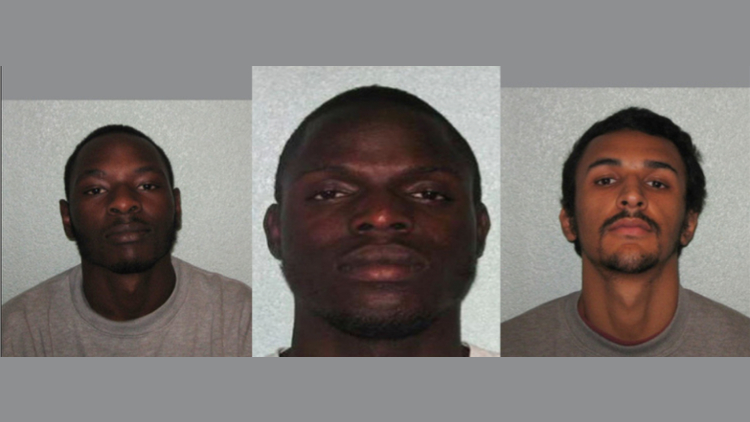
Michael Karemera (left), Glodu Wabelua (centre) and Dean Alford (right). Pic: Met police
Three London dealers, including a Lewisham resident, have been jailed under modern slavery laws for using South London youths to transport and sell drugs across Hampshire as part of a “county lines” operation.
Michael Karemera of Lewisham, Glodu Wabelua of Tottenham and Dean Alford of Canterbury, all 25, were charged under the Modern Slavery Act for recruiting six teenagers to traffic crack cocaine and heroin to Portsmouth for their “county lines” network.
On Tuesday, Karemera was sentenced to five years in prison, Alford to four and Wabelua to three-and-a-half years at Inner London Crown Court.
Karemera had previously pleaded guilty midway through trial to one count similar to trafficking under the Modern Slavery Act at Inner London Crown Court on April 17.
On the same day, Wabelua was also convicted of one count of trafficking. Alford pleaded guilty to three counts of trafficking midway through the trial, another charge was left to lie on file.
The three ran mobile drug lines to addicts in the Portsmouth area between November 2013 to September 2014 and used the victims to carry the goods to the coastal city and carry cash back to London.
The six victims, three women and three men aged 14-19 would sometimes have to stash drug packages in their body cavities.
These couriers would often have to stay in the same places as the local users until they received instructions from the three dealers.
The Met’s anti-gang Trident unit launched Operation Pibera when the offences first came to light in the spring of 2014, when five of the six victims were arrested in Portsmouth by Hampshire police.
Although several of the victims were initially prosecuted in the youth courts for supplying class A drugs, officers investigating county lines drugs operations later began examining the level of threats they had been subjected to.
The sixth and oldest victim, who has a learning difficulty, came to police attention when his outreach worker became concerned he was being exploited.
At trial, he told the court that Karemera’s associates staged a mock execution to terrify him into promising to return money that was lost. He was stripped naked and had a gun placed in his mouth, the court heard.

A gun that was used when one of the victims tried to leave. Pic: Met police
The five remaining victims refused to provide statements to police, and instead, detectives pieced together the case against the three men using DNA evidence and mobile phone data.
Judge Usha Karu said: “One of the main reasons (the victims) were chosen was because of their youth, many were arrested for possession with intent to supply and thus they too became embroiled in the justice system.”
“The level of psychological harm they may have suffered is hard to gauge.”
“For children who are vulnerable it is quick and easy money – the fact that they consented is plainly no defence,” she said.
The officer in the case, Acting Detective Inspector Simon French, said: “In addition, the imposition of Slavery and Trafficking Prevention Orders will mean that on release, the use of the very technology which enabled them to carry out these crimes in the first place, will be restricted, which can only be a good thing.”
The defendants were first arrested between September and October of 2014 and were initially charged with conspiracy to supply class A drugs and human trafficking.
The drugs supply offences were dealt with first and saw all three men being convicted of conspiracy to supply crack cocaine and heroin in February 2016 at Woolwich Crown Court.
Karemera was jailed for 10 years, Alford a year more, and Wabelua received six years and eight months after an early guilty plea.
The sentences received on Tuesday will run concurrently to their previous sentences for conspiracy to supply class A drugs.
DAC Duncan Ball from the MPS and NPCC County Lines lead, said: “Use of modern slavery legislation is an important aspect of targeting those criminal networks who exploit vulnerable children and adults to maximise their profits from drug supply. Today’s convictions send a clear message that we will utilise all legislation nationally to suppress county line activity.”




